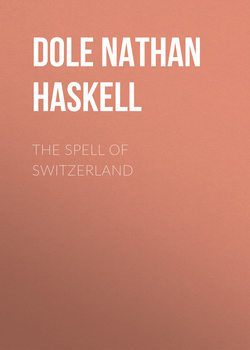Читать книгу The Spell of Switzerland - Dole Nathan Haskell - Страница 1
PREFACE
ОглавлениеThe present book is cast in the guise of fiction. The vague and flitting forms of my niece and her three children are wholly figments of the imagination. No such person as “Will Allerton” enters my doorway. The “Moto,” which does such magical service in transporting “Emile” and his admirers from place to place is as unreal as Solomon’s Carpet.
After Lord Sheffield and his family had started back from a visit to Gibbon at Lausanne, his daughter, Maria T. Holroyd, wrote the historian: “I do not know what strange charm there is in Switzerland that makes everybody desirous of returning there.” It is the aim of this book to express that charm. It lies not merely in heaped-up masses of mountains, in wonderfully beautiful lakes, in mysterious glaciers, in rainbow-adorned waterfalls; it is largely due to the association with human beings.
The spell of Switzerland can be best expressed not in the limited observations of a single person but rather by a concensus of descriptions. The casual traveller plans, perhaps, to ascend the Matterhorn or Mount Pilatus; but day after day may prove unpropitious; clouds and storms are the enemy of vision. One must therefore take the word of those more fortunate. Poets and other keen-eyed observers help to intensify the spell. These few words will explain the author’s plan. It is purposely desultory; it is not meant for a guide-book; it is not intended to be taken as a perfectly balanced treatise covering the history in part or in whole of the twenty-four cantons; it has biographical episodes but they are merely hints at the richness of possibilities, and if Gibbon and Tissot and Rousseau stand forth prominently, it is not because Voltaire, Juste Olivier, Hebel, Töpfer, Amiel, Frau Spyri, and a dozen others are not just as worthy of selection. One might write a quarto volume on the charms of the Lake of Constance or the Lake of Zürich or the Lake of Lucerne. Scores of castles teem with historic and romantic associations. It is all a matter of selection, a matter of taste. It is not for the author to claim that he has succeeded in conveying his ideas, but whatever effect his work may produce on the reader, he, himself, may, without boasting, claim that he is completely under the spell of Switzerland.
Nathan Haskell Dole.
Boston, October 1, 1913.
